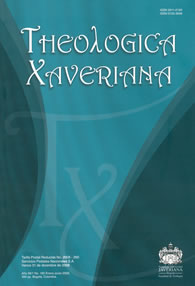Abstract
To present Paul´s theology in a concise way is no easy task. Some deny any contribution of the apostle to it, considering that he limits himself to reproducing the ideas generated in primitive Christianity. Others try to indicate “christology”, “anthropology”, “eschatology” or “ecclesiology” as the hermeneutical key themes or starting points of pauline thought. The present paper tries to show that in the mind of the apostle these four main theological themes are inextricably intertwined and shed light on each other, so that it is not possible to understand one of them without taking a look at the others.
This journal is registered under a Creative Commons Attribution 4.0 International Public License. Thus, this work may be reproduced, distributed, and publicly shared in digital format, as long as the names of the authors and Pontificia Universidad Javeriana are acknowledged. Others are allowed to quote, adapt, transform, auto-archive, republish, and create based on this material, for any purpose (even commercial ones), provided the authorship is duly acknowledged, a link to the original work is provided, and it is specified if changes have been made. Pontificia Universidad Javeriana does not hold the rights of published works and the authors are solely responsible for the contents of their works; they keep the moral, intellectual, privacy, and publicity rights.
Approving the intervention of the work (review, copy-editing, translation, layout) and the following outreach, are granted through an use license and not through an assignment of rights. This means the journal and Pontificia Universidad Javeriana cannot be held responsible for any ethical malpractice by the authors. As a consequence of the protection granted by the use license, the journal is not required to publish recantations or modify information already published, unless the errata stems from the editorial management process. Publishing contents in this journal does not generate royalties for contributors.


